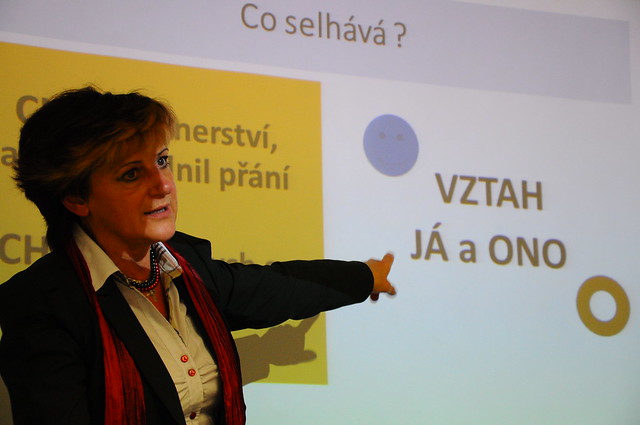Prague, Czech Republic - UPF-Czech Republic held its traditional Human Rights Day celebration in Prague on Dec. 11, 2014 by convening a conference followed by a panel discussion. The conference took place in the Cevro Institute in Prague and was organized in partnership with the Civic Institute. More than 30 people participated in spite of the very busy time before Christmas. Surely they were attracted not only by the topic itself but also by the presence of high-level speakers including two members of the Czech Parliament.
The conference had three panels. Interestingly there was no break for about three hours from the beginning until the end because the speeches and discussions were very interesting and kept the attention of the audience, and nobody wanted to interrupt the atmosphere.
In the first panel the topic was "The Significance of Human Rights in the Present Time." Dr. Juraj Lajda, secretary general of UPF-Czech Republic, outlined the basic ideas and problem areas when dealing with human rights. He addressed four areas: the definition of a human being as both a spiritual and physical being, the origin of human rights (whether they are derived from the Creator or from society?), the definition of human rights (what are and what are not human rights?) and the basis for defining human rights and their applications. In the end he emphasized the importance of a healthy family as the primary and primordial environment where we can learn about human rights, respect others and have sympathy and solidarity with our neighbors.
The second speaker, Mrs. Nina Nováková, member of the Czech Parliament and member of its Subcommitee for Human Rights, spoke about human rights in the family. In her illustrated presentation she advocated the idea that human rights can be realized only in relationship. Thus, the quality of the relationship is very important. She analyzed the relationships in the family especially between husband and wife and among parents and children. The quality of these relationships forms the base for human rights in society.
The second panel focused on "How to Apply Human Rights in Politics and the Economy." Dr. Roman Joch, director of the Civic Institute, emphasized that there are natural human rights and social rights The natural rights such as the right to life, freedom of speech, religious freedom, etc., should be guaranteed for everybody. Social rights, on the other hand, are based on consensus in the society and depend on whether society can afford to grant them (e.g., right to work). It is important to distinguish between natural human rights and social rights.
The next speaker, Mr. Marek Benda, member of the Czech Parliament and member of its Committee on Constitutional and Legal Affairs, spoke about the application of human rights from the perspectives of left-wing and right-wing politics. He mentioned that if we have social rights then our ownership rights have no meaning. Furthermore, too many rights may limit freedom (for example, if animals such as dogs have rights and if people of every preference have rights, this limits freedom for others). We recognize the right to life, but on the other hand there is a lot discussion about abortion and euthanasia.
"Human Rights in the Social Context“ was the theme of the last panel. Mr. Vít Zvánovec from the the Office for Personal Data Protection spoke about the national system of courts. He specified the responsibility of each level of the legal institutions including the Constitutional, regional and local courts. He mentioned also the European legislature and the system of courts. This helped the audience understand how the legal system operates and how human rights can be secured through this system. He mentioned that a judge should be a mature person.
It was important to hold this conference because in the Czech Republic very little public attention was devoted to Human Rights Day this year.

